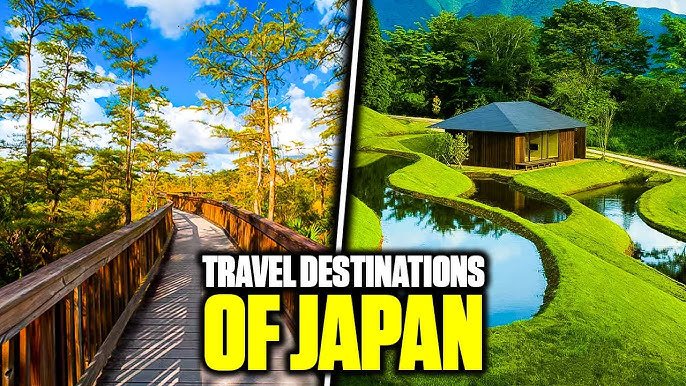Exploring off the grid japan travel offers a unique opportunity to experience the country’s rich natural beauty, cultural heritage, and tranquil lifestyle away from the bustling urban centers. This article will delve into various off-the-grid travel destinations across Japan, providing insights into hidden gems, activities, and tips for travelers seeking a more authentic experience.
1. Introduction to Off-Grid Travel in Japan
Off-grid travel in Japan allows visitors to escape the crowded tourist paths and immerse themselves in serene landscapes and traditional lifestyles. By venturing into rural areas, travelers can appreciate Japan’s natural beauty and cultural richness.
2. Yakushima Island: A UNESCO World Heritage Site
Located off the southern coast of Kyushu, Yakushima Island is renowned for its ancient cedar forests, including the famous Jomon Sugi tree, estimated to be over 2,000 years old. The island’s lush subtropical climate and diverse ecosystems make it an ideal destination for hiking and nature exploration.
3. Kamikochi: A Mountain Paradise
Kamikochi, situated in the Hida Mountains of Nagano Prefecture, offers stunning views and a tranquil environment. The area is known for its picturesque trails along the Azusa River and access to Myojin Pond and Taisho Pond, making it a perfect spot for hiking enthusiasts.
4. Kii Peninsula: Spiritual Retreat
The Kii Peninsula is home to ancient pilgrimage routes like Kumano Kodo, leading to sacred shrines nestled in dense forests. Travelers can also experience temple stays at Koyasan, where they can learn about Buddhist practices while enjoying wholesome meals prepared with local ingredients.
5. Iriomote Island: Tropical Paradise
Iriomote Island, part of Okinawa Prefecture, is a remote destination known for its pristine beaches and rich biodiversity. Visitors can engage in activities like kayaking through mangroves, snorkeling in coral reefs, and exploring local culture through traditional Okinawan cuisine.
6. Kyotango: Coastal Charm
Located a few hours from Kyoto, Kyotango offers a peaceful coastal experience with fishing villages and stunning sea views. This area remains relatively undiscovered by tourists, providing an authentic glimpse into rural Japanese life2.
7. Nasu: Hot Springs and Nature
Nasu, located just two hours from Tokyo, is known for its hot springs and beautiful landscapes. Visitors can enjoy outdoor activities such as hiking and strawberry picking at local farms while experiencing Japan’s natural beauty away from the urban hustle.
8. Aomori: Cherry Blossom Haven
In northern Honshu, Aomori is famous for its cherry blossoms and beautiful landscapes. The city features Hirosaki Castle surrounded by cherry trees, making it an ideal destination during springtime.
9. Takamatsu: Gateway to Shikoku
Takamatsu, once the main entry point to Shikoku, is now gaining popularity among off-the-beaten-path travelers. The city offers access to Megijima Island and other scenic spots that showcase Japan’s natural beauty without the crowds.
10. Shiretoko Peninsula: Untamed Wilderness

The Shiretoko Peninsula in Hokkaido is recognized as one of Japan’s most remote regions. This UNESCO World Heritage site features rugged landscapes with diverse wildlife, making it perfect for eco-tourism and outdoor adventures like hiking and wildlife watching.
11. Tottori: Unique Sand Dunes
Home to Japan’s largest sand dunes, Tottori offers a unique landscape that contrasts with typical Japanese scenery. Visitors can explore the dunes on foot or camelback while enjoying stunning views of the Sea of Japan.
12. Kurobe Gorge: Scenic Railway Adventure
The Kurobe Gorge in Toyama Prefecture features breathtaking scenery accessible via a scenic railway. This area is perfect for hiking enthusiasts looking to explore deep gorges and lush forests while enjoying the tranquility of nature.
13. Ibusuki Onsen: Unique Hot Springs Experience
In Kagoshima Prefecture, Ibusuki Onsen offers a unique experience where visitors can relax by being buried in naturally heated sand baths—a traditional practice that promotes relaxation and wellness.
14. Cultural Experiences Off the Grid
off the grid japan travel also provides opportunities to engage with local culture through workshops on traditional crafts such as pottery or textile dyeing. These experiences allow travelers to connect with locals and learn about their customs firsthand.
15. Planning Your Off-Grid Adventure
To fully enjoy off-the-grid travel in Japan:
- Consider renting a car for flexibility.
- Research local accommodations like ryokans (traditional inns) for an authentic experience.
- Engage with local guides who can offer insights into hidden gems.
- Be respectful of nature and local customs.
By exploring these lesser-known destinations, travelers can appreciate the true essence of Japan beyond its famous cities and tourist attractions. Embracing off-grid travel not only enriches your journey but also supports sustainable tourism practices that benefit local communities.




